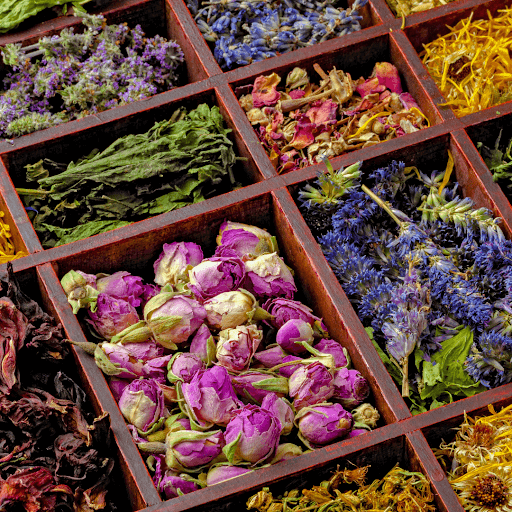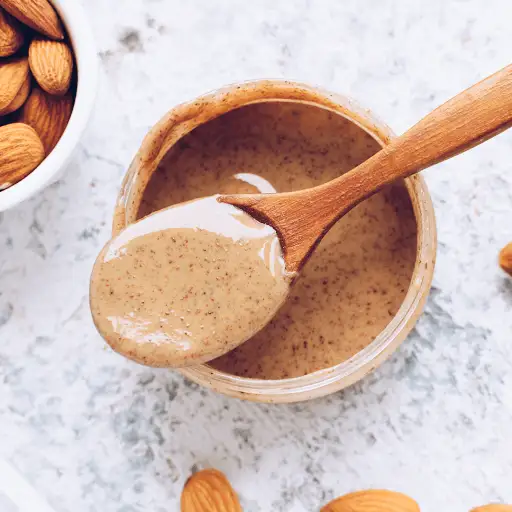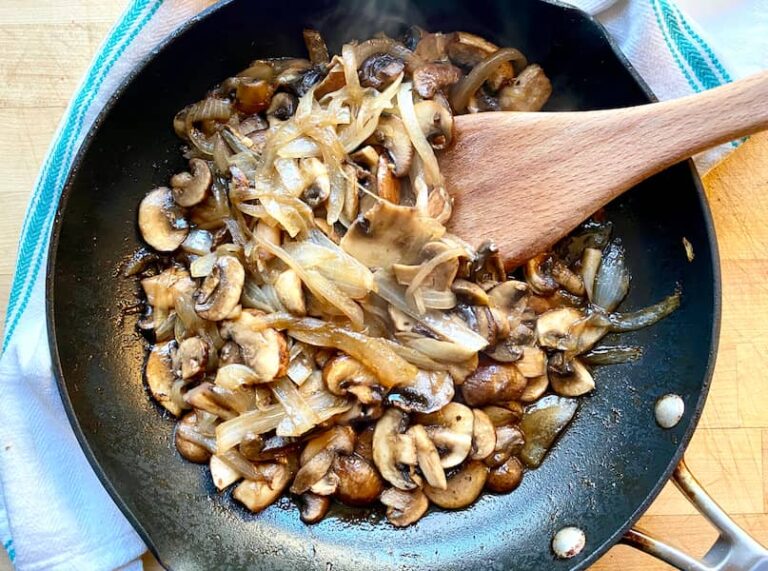I’m a big fan of tea. I love the taste, the cozy ritual of brewing a cup, and the warmth and comfort it brings.
But I also love tea for its health benefits, especially for my mood and gut health.
I’ve always been drawn to natural remedies, and tea provides a simple yet effective way to explore them.
I’ve been using tea to help with my digestion for years, and I’ve noticed a big difference. I feel better overall, and my digestion is much more regular.
From soothing an upset stomach to helping me feel lighter after heavy meals, tea has become a staple in my daily routine.
In today’s blog post, I will share some of the best teas for gut health and good digestion. I’ll also talk about choosing the right tea for you and how to incorporate tea into your daily routine.
Understanding Your Gut
Before we talk about tea, let’s talk about the gut. The gut is a complex ecosystem of trillions of bacteria, viruses, and fungi. This ecosystem is called the gut microbiome. The gut microbiome plays a vital role in digestion, immunity, and overall health.
When the gut microbiome is out of balance, it can lead to several digestive problems, such as bloating, constipation, diarrhea, and acid reflux. It can also lead to other health problems, such as obesity, diabetes, and heart disease.
A healthy gut is vital for overall health, but why? Your digestive tract, which includes your stomach, small intestine, and large intestine, does much more than break down food. It absorbs nutrients, supports your immune system, and even influences your mental health.
Supporting your gastrointestinal health with a proper diet, hydration, and natural remedies like tea can make a huge difference.
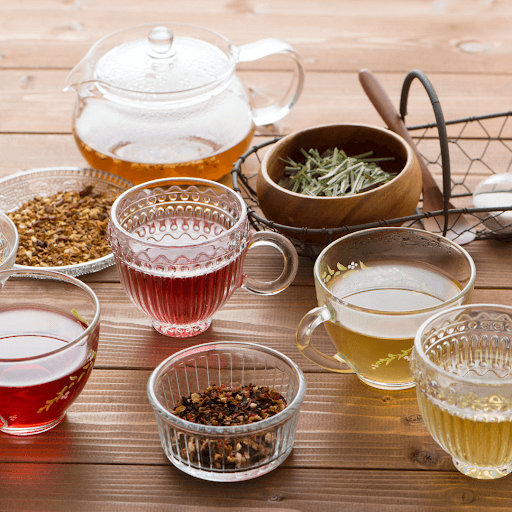
Exploring Different Varieties of Tea
Tea is a great way to support gut health. There are many different types of tea, each with its own unique set of benefits. Let’s explore them and learn how they contribute to your digestive health.
Some of the most popular types of tea include:
- Green Tea: Rich in tea polyphenols and antioxidants, green tea supports the gut microbiota by promoting the growth of beneficial bacteria. It’s also known for its anti-inflammatory properties, making it great for soothing the gastrointestinal tract.
- Black Tea: An aged black tea with a robust flavor, black tea helps balance the gut microbiome and may aid in food movement through the digestive tract.
- Oolong Tea: This tea has a perfect balance of polyphenols, which may help with fat digestion and improve overall gut health.
- White Tea: Known for its delicate flavor and high antioxidant content, white tea is gentle on the stomach and supports healthy digestion.
- Pu-erh Tea: This aged tea from China is praised for its probiotic-like benefits. Pu-erh tea aids in digestion helps with weight loss, and supports the gut microbiota.
- Herbal Teas: From chamomile tea to peppermint tea, herbal teas are a favorite for their extensive health benefits. They’re caffeine-free and aid with specific digestive issues, such as bloating or acid reflux.
The Best Teas for a Happy Gut
Here are some of the best teas for gut health:
- Ginger tea: Ginger is a powerful anti-inflammatory that can help to soothe the gut and relieve nausea, vomiting, and diarrhea. Made from the root of the ginger plant, this tea is packed with anti-inflammatory properties.
- Benefits: Relieves nausea, reduces bloating, and eases stomach pain. It’s a natural digestive aid and an excellent choice for morning sickness or motion sickness.
- How to use: Brew fresh ginger slices or use ginger tea bags.
- Peppermint tea: Peppermint is a relaxing herb that can help to relieve stomach cramps, bloating, and gas. It’s known for its refreshing flavor. Interesting fact: Peppermint tea contains active ingredients like menthol.
- Benefits: Alleviates gas, bloating, and stomach cramps. Peppermint oil is another popular natural remedy for digestive discomfort.
- Chamomile tea: Chamomile is a gentle herb that can help to calm the gut and relieve inflammation. This calming tea has been used in herbal medicine for centuries.
- Benefits: Reduces inflammation, soothes an upset stomach, and helps with acid reflux.
- Fennel tea: Fennel is a carminative herb that can help to relieve gas and bloating. Made from fennel seeds, this tea is a must-have for digestion issues.
- Benefits: Relieves bloating, gas, and intestinal inflammation.
- Licorice root tea: Licorice root is a demulcent herb that can help to soothe the gut lining and relieve ulcers.
- Benefits: Soothes the digestive lining and may help with symptoms of gastroesophageal reflux disease (GERD).
- Marshmallow root tea: Marshmallow root is an herb that can help to soothe the gut lining and relieve inflammation.
- Benefits: Forms a protective layer over the digestive tract, reducing irritation and promoting a healthier digestive system.
- Dandelion root tea: Dandelion root is a bitter herb that can help to stimulate bile flow and improve liver function.
- Benefits: Supports liver function, aiding in the breakdown of fatty foods and toxins.
- Yerba mate: Yerba mate is a stimulating herb that can help to boost metabolism and improve digestion.
- Benefits: Boosts metabolism and promotes digestion, making it a fantastic choice for those on a weight loss journey.
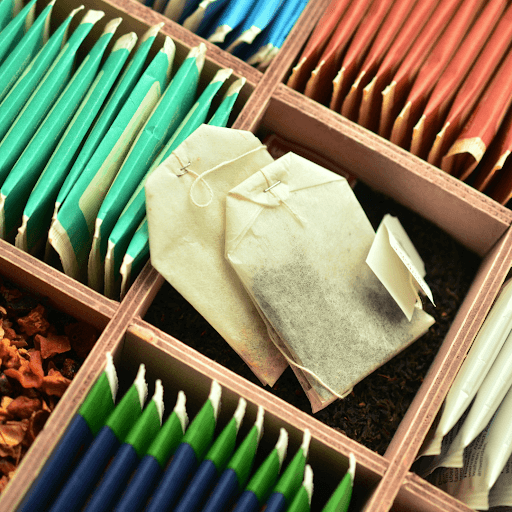
Tea and My Daily Routine
I like to start my day with a cup of ginger tea. It helps to wake me up and get my digestion going. I also like to drink peppermint tea after meals to help with digestion.
If you’re looking for a more general digestive aid, you can try a blend of herbs like chamomile, fennel, and licorice root.
Tea and Your Daily Routine
Incorporating tea into your daily routine is easier than you might think. Here are some tips:
- Start Your Day Right:
- Enjoy a cup of green tea or ginger tea in the morning for a metabolism boost and digestive support.
- Post-Meal Ritual:
- Sip on peppermint tea or fennel tea after a rich meal to ease digestion.
- Evening Wind-Down:
- Chamomile tea is perfect for calming your stomach and preparing you for restful sleep.
- Hydration on the Go:
- Carry a thermos of your favorite tea bags for a healthy drink anytime.
Tips and Tricks for Enjoying Tea
- Experiment with Different Teas: Don’t be afraid to explore the wide world of tea! Try different varieties, such as green tea, black tea, herbal teas, and pu-erh teas, to find your favorites.
- Consider Loose Leaf Tea: Loose leaf tea often offers a more flavorful and aromatic experience than tea bags. Invest in a good quality tea strainer to enjoy the full flavor.
- Pay Attention to Quality: Choose high-quality teas from reputable sources. Look for organic teas whenever possible to minimize exposure to pesticides and harmful chemicals.
- Brew Properly: Follow the recommended brewing instructions for each type of tea. Over-brewing can lead to a bitter taste and may release excessive tannins, which can have a negative impact on digestion.
- Incorporate Tea into Your Daily Routine: Make drinking tea a regular part of your day. Whether it’s a morning cup of green tea or a soothing chamomile tea before bed, find ways to enjoy tea throughout the day.
- Consider Tea Blends: Experiment with tea blends that combine different herbs and spices for unique flavors and added health benefits. For example, try a blend of ginger, lemon, and honey for a refreshing and immune-boosting tea.
- Listen to Your Body: Pay attention to how different teas affect your body. If you experience any negative side effects, such as insomnia or digestive upset, try a different type of tea.
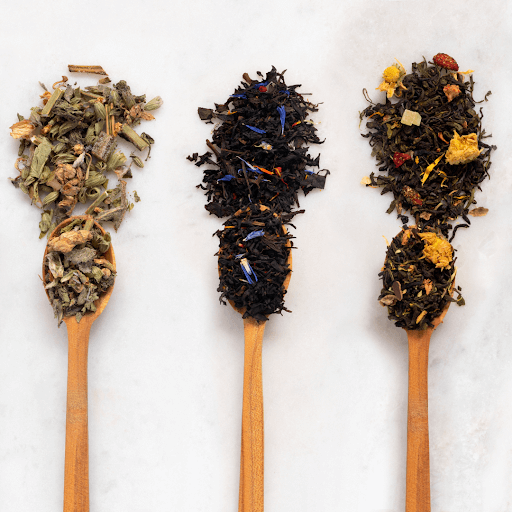
Tea and Weight Loss
Some teas may also help with weight loss. Green tea, for example, is a thermogenic herb that can help to boost metabolism. Oolong tea and Pu-erh tea may also help to promote weight loss. However, it’s important to note that tea is not a magic weight-loss solution.
Combine it with a balanced diet, regular exercise, and an overall healthy lifestyle for the best results.
If weight loss is one of your goals, certain teas can be your best choice for cutting down on calories:
- Metabolism Boosters: Green tea and oolong tea are known for their thermogenic effects, helping your body burn more calories.
- Appetite Control: Herbal teas like yerba mate can help curb cravings and promote satiety.
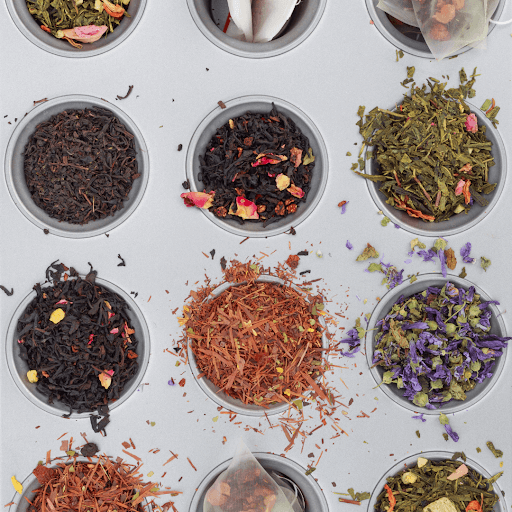
Tea and Beyond: Supporting Gut Health
While tea can be a valuable tool for supporting gut health, it’s important to remember that it’s just one piece of the puzzle. A holistic approach to gut health involves:
- Maintaining a Balanced Diet: Focus on whole foods, such as fruits, vegetables, whole grains, and lean protein.
- Staying Hydrated: Drink plenty of water throughout the day to keep your digestive system functioning correctly.
- Managing Stress: Chronic stress can negatively impact gut health. Practice stress-reducing techniques such as yoga, meditation, or deep breathing exercises.
- Getting Enough Sleep: Adequate sleep is crucial for overall health, including gut health. Aim for 7-9 hours of quality sleep per night.
- Regular Exercise: Physical activity can help to improve digestion and promote a healthy gut microbiome.
Tea and Your Mood: The Gut-Brain Connection
Did you know that your gut and your brain are intricately connected? This connection, known as the gut-brain axis, plays a significant role in your mood and overall well-being.
An imbalance in the gut microbiome can lead to increased levels of stress hormones, which can negatively impact your mood.
- The Calming Effects of Tea: Many herbal teas, such as chamomile tea and lavender tea, have calming properties that can help to reduce stress and anxiety. These teas can indirectly support a healthier gut and improve your mood by promoting relaxation and reducing stress levels.
- Tea and Serotonin Production: Some research suggests that certain compounds in tea may influence the production of serotonin, a neurotransmitter that plays a crucial role in regulating mood, happiness, and sleep.
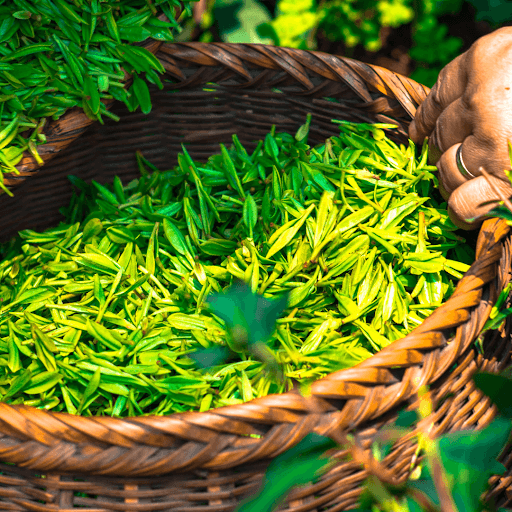
Important Considerations
When choosing a tea for gut health, it’s essential to choose a high-quality tea. You can find high-quality teas at your local health food store or online.
It’s also important to be aware of any potential side effects of tea. For example, some teas contain caffeine, which can cause insomnia and anxiety.
When choosing the right tea, keep these points in mind:
- Quality Matters:
- Opt for high-quality loose-leaf tea or premium tea bags from reputable sources.
- Consider exploring local tea shops or online retailers offering free shipping.
- Know Your Needs:
- Some teas may not suit everyone. Consult a healthcare provider, especially if you have chronic conditions or are pregnant.
- Mind Potential Side Effects:
- Caffeinated teas may cause jitters or affect sleep if consumed late in the day.
Fun Facts About Tea
- Tea History: Tea originated in China and has been enjoyed for thousands of years.
- Tea and Longevity: Some cultures have long associated tea consumption with longevity and overall well-being.
- The Tea Ceremony: The Japanese tea ceremony, known as “Chado” or “the way of tea,” is a traditional ritual that emphasizes mindfulness, harmony, and respect.
- Tea and Art: Tea has inspired countless artists and writers throughout history, from poets to painters.
Interesting Things to Know
- Kombucha: This fermented tea drink is gaining popularity for its probiotic benefits. Kombucha is created by adding a SCOBY (Symbiotic Culture Of Bacteria and Yeast) to sweetened tea, resulting in a tangy, effervescent beverage.
- Matcha: This powdered green tea is rich in antioxidants and provides a more concentrated dose of nutrients than regular green tea. Matcha is traditionally used in Japanese tea ceremonies and offers a unique, earthy flavor.
- Tea Gardens: Visiting a tea garden can be a delightful experience, allowing you to learn about tea cultivation and enjoy the beauty of the tea plants. Many tea gardens offer tours, tastings, and the opportunity to purchase freshly harvested leaves.
- The Camellia Sinensis Plant: All true teas (black, green, oolong, white) originate from the Camellia sinensis plant. The processing methods used to prepare the leaves determine the final type of tea.
- Tea and Caffeine: While caffeine is often associated with tea, the caffeine content varies significantly between types. White tea generally has the lowest caffeine content, while black tea typically has the highest.
- Tea and Hydration: Despite containing caffeine, tea can contribute to overall hydration due to its high water content.
Ready to give your gut some love? Following these tips and taking a holistic approach to gut health can unlock the power of tea and other healthy habits.


